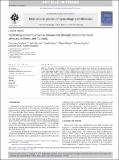| dc.contributor.author | Coeytaux, Francine | |
| dc.contributor.author | Hessini, Leila | |
| dc.contributor.author | Ejano, Nondo | |
| dc.contributor.author | Obbuyi, Albert | |
| dc.contributor.author | Oguttu, Monica | |
| dc.contributor.author | Osur, Joachim | |
| dc.contributor.author | Shuken, Kristen | |
| dc.contributor.author | Shuken, Kristen | |
| dc.date.accessioned | 2022-03-26T12:34:28Z | |
| dc.date.available | 2022-03-26T12:34:28Z | |
| dc.date.issued | 2014 | |
| dc.identifier.citation | Coeytaux F, et al, Facilitating women’s access to misoprostol through community-based advocacy in Kenya and Tanzania, Int J Gynecol Obstet (2014), http://dx.doi.org/10.1016/j.ijgo.2013.10.004 | en_US |
| dc.identifier.other | DOI:10.1016/j.ijgo.2013.10.004 | |
| dc.identifier.uri | https://repository.amref.ac.ke/handle/123456789/634 | |
| dc.description | © 2014 International Federation of Gynecology and Obstetrics. Published by Elsevier Ireland Ltd. All rights reserved. | en_US |
| dc.description.abstract | Objective: To explore the feasibility of educating communities about gynecologic uses for misoprostol at the
community level through community-based organizations in countries with restrictive abortion laws.Methods:
In 2012, the Public Health Institute and Ipas conducted an operations research study, providing small grants to
28 community-based organizations in Kenya and Tanzania to disseminate information on the correct use of
misoprostol for both abortion and postpartum hemorrhage. These groups were connected to pharmacies selling
misoprostol. The primary outcomes of the intervention were reports from the community-based organizations
regarding the health education strategies that they had developed and implemented to educate their communities.
Results: The groups developed numerous creative strategies to reach diverse audiences and ensure access to
misoprostol pills. Given the restrictive environment, the groups attributed their success to having addressed the
use of misoprostol for both indications (abortion and postpartum hemorrhage) and to using a harm reduction
approach to frame the advocacy. Conclusion: This initiative proves that, even where abortion is legally restricted
and socially stigmatized, community-based organizations can publicly and openly share information about
misoprostol and refer it to women by using innovative and effective strategies, without political backlash.
Furthermore, it shows that communities are eager for this information. | en_US |
| dc.language.iso | en | en_US |
| dc.publisher | Elsevier Ireland Ltd. | en_US |
| dc.subject | Abortion | en_US |
| dc.subject | Advocacy | en_US |
| dc.subject | Hemorrhage | en_US |
| dc.subject | Misoprostol | en_US |
| dc.subject | Pharmacy access | en_US |
| dc.subject | Postpartum | en_US |
| dc.title | Facilitating Women’s Access to Misoprostol through Community-based Advocacy in Kenya and Tanzania | en_US |
| dc.type | Article, Journal | en_US |

